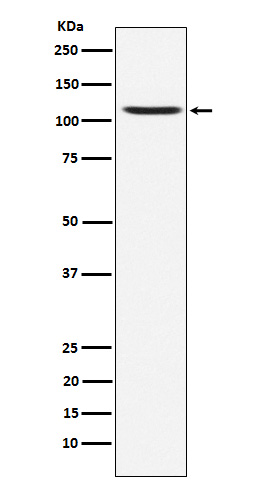
| WB | 1/1000-1/2000 | Human,Mouse,Rat |
| IF | 咨询技术 | Human,Mouse,Rat |
| IHC | 咨询技术 | Human,Mouse,Rat |
| ICC | 技术咨询 | Human,Mouse,Rat |
| FCM | 1/20-1/100 | Human,Mouse,Rat |
| Elisa | 咨询技术 | Human,Mouse,Rat |
| Aliases | AMPA4; GluA4; GluR4; GLUR4C; GLURD; Gria4;;GluR4 |
| WB Predicted band size | 101 kDa |
| Host/Isotype | Rabbit IgG |
| Antibody Type | Primary antibody |
| Storage | Store at 4°C short term. Aliquot and store at -20°C long term. Avoid freeze/thaw cycles. |
| Species Reactivity | Human,Mouse,Rat |
| Immunogen | A synthesized peptide derived from human GluR4 |
| Formulation | Purified antibody in PBS with 0.05% sodium azide,0.05% BSA and 50% glycerol. |
+ +
以下是关于GluA4抗体的3篇参考文献概览:
1. **"AMPA receptor subunit GluA4 is critical for postnatal maturation of cerebellar stellate cells"**
- **作者**: Z. Yang et al.
- **摘要**: 研究通过GluA4抗体免疫标记发现,GluA4亚基在小脑星形细胞发育中起关键作用,其缺失导致突触传递异常和运动协调障碍。
2. **"GluA4 antibodies reveal distinct synaptic localization patterns in the rodent hippocampus"**
- **作者**: S. Petralia et al.
- **摘要**: 利用GluA4特异性抗体进行免疫组化,揭示了该亚基在海马不同亚区的突触分布差异,提示其在神经元网络中的功能特异性。
3. **"Selective loss of GluA4 AMPA receptor subunits in Huntington’s disease"**
- **作者**: K. Reiner et al.
- **摘要**: 通过Western blot和免疫荧光结合GluA4抗体,发现亨廷顿病模型中GluA4表达显著降低,可能与认知功能障碍相关。
这些研究均依赖GluA4抗体进行蛋白定位、功能分析或疾病机制探索。
The GluA4 antibody is a specialized tool used to detect and study the GluA4 subunit, a critical component of α-amino-3-hydroxy-5-methyl-4-isoxazolepropionic acid (AMPA) receptors. These receptors, predominantly located in the central nervous system, mediate fast excitatory synaptic transmission and play essential roles in synaptic plasticity, learning, and memory. The GluA4 subunit (encoded by the GRIA4 gene) forms tetrameric ion channels with other AMPA receptor subunits (GluA1-4), influencing channel kinetics, calcium permeability, and receptor trafficking. While GluA4 is less ubiquitously expressed than other subunits, it is particularly abundant in cerebellar neurons, auditory brainstem nuclei, and specific interneuron populations, and its expression varies during development.
GluA4-specific antibodies enable researchers to investigate the subunit’s distribution, expression levels, and functional roles in physiological and pathological contexts. These antibodies are widely utilized in techniques like Western blotting, immunohistochemistry, and immunoprecipitation. Studies employing GluA4 antibodies have revealed its involvement in synaptic maturation, auditory processing, and motor coordination. Dysregulation of GluA4 has been implicated in neurological disorders, including epilepsy, intellectual disabilities, and neurodegenerative diseases. Antibody validation via knockout controls or siRNA knockdown is critical to ensure specificity, as AMPA receptor subunits share structural homology. Overall, GluA4 antibodies are indispensable for advancing understanding of glutamatergic signaling and its therapeutic targeting.
×